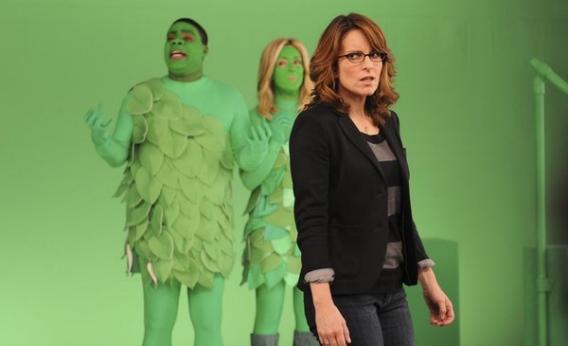At this point, the day before its series finale, 30 Rock appears to have two principal legacies: The image of modern womanhood embodied by Liz Lemon, and the little bits of linguistic inventiveness that have entered the American lexicon. The show’s fun with words, names, and phrases—from Jackie Jormp-Jormp to MILF Island to Reaganing—has set it apart on TV from the beginning, prompting GOOD to consider “the language of 30 Rock” back in 2009 and Vulture to create a glossary of 30 Rock-isms in 2010.
But 10 or 20 years from now, will any of the show’s catchphrases still pop up in casual conversation?
With apologies to jagweed and mind grapes, we’ve selected just five that we believe will always be with us, more or less, and have listed them below in alphabetical order. Perhaps not coincidentally, the hardiest of the words and phrases popularized by 30 Rock were, for the most part, not coined by 30 Rock—of the five selections below, only one had pretty much never previously appeared with the exact meaning affixed to it by the show. (As those careful qualifications suggest, even that phrase was not 100 percent new to the language.) It is not so easy, it seems, to introduce something wholly new to English and have it stick—though 30 Rock certainly did its best.
In any case, the list is below. Let us know which ones we were wrong to leave out—and which we were wrong to include—in the comments.
Blergh
Variations (and spellings) of blergh or blurgh (particularly blargh) have been around for a while, but 30 Rock put its own spin on it: Blërg isn’t just a handy expression of frustration to use when the network won’t let you curse, it’s also the name of Liz’s preferred line of Ikea furniture. (Is there a better example of frustration than putting together furniture that’s missing half the pieces?) Google trends suggests that 30 Rock pushed the word into the mainstream after it appeared in Season 1’s 2007 episode “Cleveland.” As often happens with slang, blergh has become prevalent enough that we will someday probably forget how it became so popular.
Dealbreaker
The term “deal breaker” may seem old, but it’s not, really: The earliest citation in the OED is from 1979, while Google Ngrams shows the phrase popping up just a few years before that—and not really taking off until the ’90s. (It was, in its two-word form, the title of a 1995 Harlan Coben novel.) It initially meant something that might derail business or political negotiations, but once it became popular it quickly spread to other contexts. 30 Rock wasn’t the first to use “dealbreaker” in reference to relationships, but the show popularized its use as a spontaneous exclamation. As in, “He never takes off his socks? Dealbreaker!” These days, you’re just as likely to hear the phrase describing a boyfriend’s (or girlfriend’s) quirks as an unacceptable provision to a contract.
EGOT
In 2008, Tim Long wrote a short piece for Vanity Fair about Philip Michael Thomas, who, Long said, used to wear a gold medallion “emblazoned with the letters EGOT, which stood for Emmy, Grammy, Oscar, and Tony,” awards Thomas planned to win in the next five years. The following year on 30 Rock, Tracy Jordan found a diamond-encrusted EGOT necklace and sets out to join the elite ranks of such all-around winners. Tracy reached his goal in Season 5, and, thanks to 30 Rock, the EGOT has reached the mainstream.
“I want to go to there”
Perhaps the only phrase here that is a bona fide 30 Rock coinage. We even know where it came from: Tina Fey got the odd grammatical construction from her young daughter Alice, and it quickly became one of 30 Rock’s most repeated quotes, and now even emblazons some NBC merchandise. Equally popular as a GIF caption and interjection, “I want to go to there” is an expression of extreme longing, whether for Cheesy Blasters or your attractive if dimwitted, neighbor.
“Sexy Baby Voice”
The “sexy baby voice” goes back at least as far as Betty Boop, and the phrase itself seems to have made its first appearance in 1975 in Ms. magazine. But that appearance didn’t exactly set the world on fire: The phrase doesn’t show up much outside of erotic fiction until 2011, when 30 Rock examined the infantilizing, attention-grabbing tactic in “TGS Hates Women,” an episode that skewered the controversy surrounding the hiring of model/actress Olivia Munn by The Daily Show. The phrase has since caught on, and may or may not have inspired the name of a disturbing documentary from last year.
